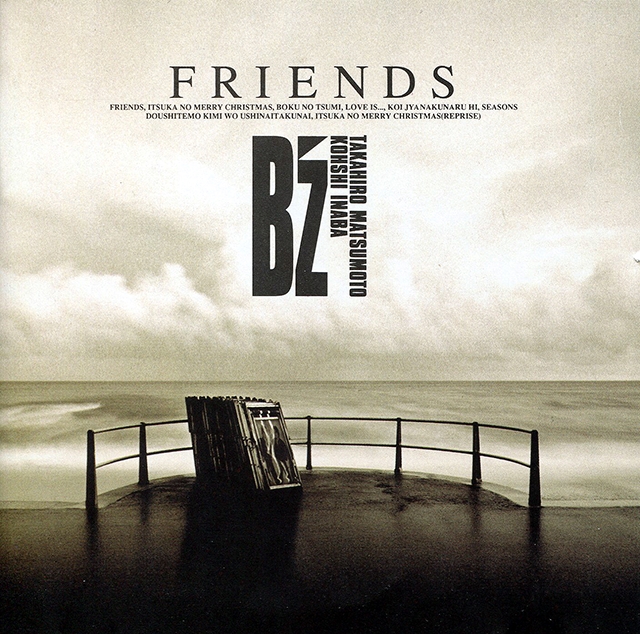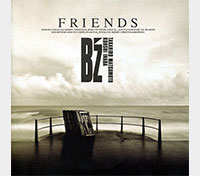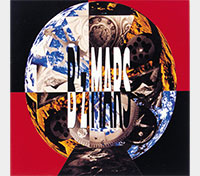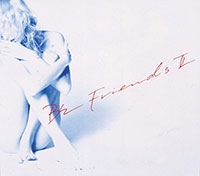FRIENDS: Difference between revisions
| Line 44: | Line 44: | ||
::::Apart from the first vocal track present, "Koi Jyanakunaru Hi" is undoubtedly the second most popular song from the mini album. Although it has not been performed since [[B'z LIVE-GYM '93 "RUN"]], it was voted to tenth place for the fan-slected compilation ''[[B'z The Best "ULTRA Treasure"]]'' and included on its first disc. In a 2014 fan club poll asking which songs fans would like to hear as part of [[B'z LIVE-GYM 2015 -EPIC NIGHT-]], the song finished third but ultimately was not performed. | ::::Apart from the first vocal track present, "Koi Jyanakunaru Hi" is undoubtedly the second most popular song from the mini album. Although it has not been performed since [[B'z LIVE-GYM '93 "RUN"]], it was voted to tenth place for the fan-slected compilation ''[[B'z The Best "ULTRA Treasure"]]'' and included on its first disc. In a 2014 fan club poll asking which songs fans would like to hear as part of [[B'z LIVE-GYM 2015 -EPIC NIGHT-]], the song finished third but ultimately was not performed. | ||
:<small>SCENE 4:</small> '''SEASONS''' | :<small>SCENE 4:</small> '''SEASONS''' | ||
:::[[File:m04_06.ogg]] <font color="Indigo">'''Seasons:''' ''The passage of time.''</font> | :::[[File:m04_06.ogg]] <font color="Indigo">'''Seasons:''' ''The passage of time, with the two having parted after the meeting prior with the intention of parting for good. Spring comes, summer is forgotten, and fall passes, until...''</font> | ||
::::Recorded only here on this album, "SEASONS" is used to bridge the time between the third and fifth scenes on the album. It is performed solely by Tak on an acoustic guitar. | ::::Recorded only here on this album, "SEASONS" is used to bridge the time between the third and fifth scenes on the album. It is performed solely by Tak on an acoustic guitar. | ||
:<small>SCENE 5:</small> '''[[Doushite mo Kimi wo Ushinaitakunai (Lyrics)|Doushite mo Kimi wo Ushinaitakunai]]''' — ''No Matter What, I Don't Want to Lose You'', どうしても君を失いたくない | :<small>SCENE 5:</small> '''[[Doushite mo Kimi wo Ushinaitakunai (Lyrics)|Doushite mo Kimi wo Ushinaitakunai]]''' — ''No Matter What, I Don't Want to Lose You'', どうしても君を失いたくない | ||
Revision as of 15:20, 12 November 2017
| FRIENDS | ||||
|---|---|---|---|---|
 | ||||
| Mini album by B'z | ||||
| Released | December 9, 1992 | |||
| Genre | Adult rock | |||
| Length | 26:47 | |||
| Producer | Tak Matsumoto | |||
| B'z chronology | ||||
| ||||
FRIENDS is the fourth mini album by B'z, released on December 9, 1992. The release is their first concept album, with each song contributing to an overall story for the first time in the B'z catalogue. The music was composed to be akin to that of the soundtrack to a movie, with each track being labeled as "scenes". A follow-up album entitled FRIENDS II would be released four years later in 1996 but would not feature a connected narrative.
The mini album would be the band's first venture into "adult-oriented rock" music when it hit shelves in December of 1992. It stood in stark contrast to their fall album RUN that contained hard rock numbers such as "ZERO" and "Out Of Control" and aided in demonstrating their versatility. Tak Matsumoto noted that the genesis of the project was that, "I wanted to make an album that was like a movie's soundtrack." The songs' connected lyrics were all written in the course of one flight, according to Koshi Inaba. The vocal tracks are thus represented by four themes: "Recollections", "Reunion", "Conflict", and "Resolution". The title of the album, "FRIENDS", is meant to encompass the overall theme of the narrative as the protagonists are not romantically linked at the time of the story.
The album's opening vocal song "Itsuka no Merry Christmas" has proven one of the band's most popular songs of any sort. It has been downloaded over 500,000 times as a ringtone according to the Recording Industry Association of Japan, and has sold more than 100,000 in the form of a full-length download for cell phones alone. To date, decades later, the song is often requested and played in Japan during the holiday season and is the subject of frequent covers on numerous television programs, including a popular cover performed by fellow Japanese artists Gackt and Ayumi Hamasaki as a duet in 2001. B'z themselves have only performed the song on television three times: in 1994, 2002, and 2005. The song would also be the subject of two reversions on two separate winter compilations, with the releases of The Ballads ~Love & B'z~ in 2002 and B'z The Best "Pleasure II" in 2005.
Despite its enduring popularity, "Itsuka no Merry Christmas" is suitably only performed at LIVE-GYM concerts when the band's tour schedule runs into winter months. Fellow album track "Boku no Tsumi" has never been performed live, with "Koi Jyanakunaru Hi" and "Doushite mo Kimi wo Ushinaitakunai" being performed only during B'z LIVE-GYM '93 "RUN".
Upon release, concept album FRIENDS sold 706,950 physical copies in its first week. This would make it their highest-selling mini album debut to that point, with its sequel FRIENDS II succeeding it. As with all other B'z mini albums released to date, FRIENDS has been certified Million by the Recording Industry Association of Japan for sales in excess of 1,355,530 physical copies sold. The lasting legacy of the album has led to significant digital and ringtone sales of lead track "Itsuka no Merry Christmas" in subsequent years.
Track listing
All music and guitar by Tak Matsumoto. All lyrics and lead vocals by Koshi Inaba.
- PROLOGUE: Friends
- File:m04 01.ogg An instrumental song, Friends lacks even guitar with its arrangement being performed entirely with strings instead.
- SCENE 1: Itsuka no Merry Christmas — A Merry Christmas Once Upon A Time, いつかのメリークリスマス
- File:m04 02.ogg Recollections: The titular "FRIENDS" spoken of in the album's title were once romantically involved but no longer. It is now December as the male protagonist describes the festive mood that only reminds him of their past relationship. He laments the loss ("I felt we were always going to be together, my hands forever holding yours"). A past Christmas spent together spent in happiness is recounted, until it's revealed he now walks the streets alone, watching smiling couples pass by arm in arm.
- Not only the foremost song on the album, "Itsuka no Merry Christmas" quickly became one of the band's signature songs—a distinction it carries to this day decades later. Although never a single, it rivals many in the band's catalogue in terms of popularity and remains a Christmas staple in Japan.
- File:m04 02.ogg Recollections: The titular "FRIENDS" spoken of in the album's title were once romantically involved but no longer. It is now December as the male protagonist describes the festive mood that only reminds him of their past relationship. He laments the loss ("I felt we were always going to be together, my hands forever holding yours"). A past Christmas spent together spent in happiness is recounted, until it's revealed he now walks the streets alone, watching smiling couples pass by arm in arm.
- SCENE 2-1: Boku no Tsumi — My Sin, 僕の罪
- File:m04 03.ogg Reunion: Time continues to pass. Reaching for cigarettes he put aside long ago, he feels compelled to finally call her again. Hearing her voice, everything changes ("While sewing up the hole in my heart, the words came bursting out: 'I want to see you'"). The title, "My Sin", refers to his inability to let go or even let enough time pass before trying again ("I know, I know, I understand; Not yet, not yet, not enough time has passed yet"). When they decide to meet, he sees that her hairstyle has changed but "the smile I've become accustomed to is just the same". The song ends as he oscillates between trying to win her back and accepting the realization that time is slowly forgetting their time together.
- The most upbeat of the album's tracks, "Boku no Tsumi" is the only song from the work to never be performed live apart from the instrumentals. The song begins with somber guitar prior to the shattering of glass. The prominent female chorus vocals are provided by famed Japanese pop singer Maki Ohguro.
- File:m04 03.ogg Reunion: Time continues to pass. Reaching for cigarettes he put aside long ago, he feels compelled to finally call her again. Hearing her voice, everything changes ("While sewing up the hole in my heart, the words came bursting out: 'I want to see you'"). The title, "My Sin", refers to his inability to let go or even let enough time pass before trying again ("I know, I know, I understand; Not yet, not yet, not enough time has passed yet"). When they decide to meet, he sees that her hairstyle has changed but "the smile I've become accustomed to is just the same". The song ends as he oscillates between trying to win her back and accepting the realization that time is slowly forgetting their time together.
- SCENE 2-2: Love Is...
- File:m04 04.ogg As with other instrumentals on the album, "Love Is..." is performed by one instrument, in this case a keyboard. Its melody is sourced from the the next track, "Koi Jyanakunaru Hi", and is effected to sound akin to a music box.
- SCENE 3: Koi Jyanakunaru Hi — The Day Love Ceased to Be, 恋じゃなくなる日
- File:m04 04.ogg Conflict: The two decide to meet again to rekindle what they once lost. Collecting shells along the winter beach, they continue to hang on despite the answer being obvious ("We can't just let go no matter how long it's dragged on, so we keep suppressing these dimming feelings the best we can"). All they once did together in happier times no longer feel the same as before ("Puzzled and meaningless smiles on our faces become replaced by yet another bewildered feeling"). Burying a shell on which they had painted their memories and hearing the echo of distant bells, it signalled "both the end and its beginning". After having tried again to no avail, he mutters to himself, "I don't need love anymore". On a paved street in the middle of the winter night, she slips her arm into his. Still, through his doubt, he looks to the sky, returning to the song's title with certainty: "It was the sky of the day when love ceased to be."
- Apart from the first vocal track present, "Koi Jyanakunaru Hi" is undoubtedly the second most popular song from the mini album. Although it has not been performed since B'z LIVE-GYM '93 "RUN", it was voted to tenth place for the fan-slected compilation B'z The Best "ULTRA Treasure" and included on its first disc. In a 2014 fan club poll asking which songs fans would like to hear as part of B'z LIVE-GYM 2015 -EPIC NIGHT-, the song finished third but ultimately was not performed.
- File:m04 04.ogg Conflict: The two decide to meet again to rekindle what they once lost. Collecting shells along the winter beach, they continue to hang on despite the answer being obvious ("We can't just let go no matter how long it's dragged on, so we keep suppressing these dimming feelings the best we can"). All they once did together in happier times no longer feel the same as before ("Puzzled and meaningless smiles on our faces become replaced by yet another bewildered feeling"). Burying a shell on which they had painted their memories and hearing the echo of distant bells, it signalled "both the end and its beginning". After having tried again to no avail, he mutters to himself, "I don't need love anymore". On a paved street in the middle of the winter night, she slips her arm into his. Still, through his doubt, he looks to the sky, returning to the song's title with certainty: "It was the sky of the day when love ceased to be."
- SCENE 4: SEASONS
- File:m04 06.ogg Seasons: The passage of time, with the two having parted after the meeting prior with the intention of parting for good. Spring comes, summer is forgotten, and fall passes, until...
- Recorded only here on this album, "SEASONS" is used to bridge the time between the third and fifth scenes on the album. It is performed solely by Tak on an acoustic guitar.
- File:m04 06.ogg Seasons: The passage of time, with the two having parted after the meeting prior with the intention of parting for good. Spring comes, summer is forgotten, and fall passes, until...
- SCENE 5: Doushite mo Kimi wo Ushinaitakunai — No Matter What, I Don't Want to Lose You, どうしても君を失いたくない
- File:m04 07.ogg Resolution: A new winter has arrived and a year has passed since their reunion. In a daydream brought on by the season, he thinks of "nostalgic days long past" and considers whether he was wrong to walk away ("'No matter what, I don't want to lose you!' I scream that from the deepest recesses of my chest"). From his car, he notices a couple walking closely, arm in arm. He again considers the cost of love to those involved ("When love ceases to be, is it considered a betrayal to the other person?"). He decides that it may be best if they go on living after closing that chapter, and if they could forget the animosity between them, there may still be a place for them. The story ends with a reversal of roles but with a new perspective ("After you wake up, you'll be going out to join the crowd of people on this unchanged street"). Their time together would not be meaningless, he concludes, as there is something after love in the form of "FRIENDS".
- Running at over six minutes long, "Doushite mo Kimi wo Ushinaitakunai" is the longest song on the album by a considerable difference. It's the only true power ballad included as well and is driven by both guitar and keyboards. Though it should come as no surprise given all of the songs are connected, the album contains a direct reference to the song from the third scene, "Koi Jyanakunaru Hi". Interestingly, an unreleased instrumental version of the song served as the ending theme to Music Station from 1992 through 2002 until another composition by Tak Matsumoto took over in the form of "#1090 [Sen Mu Ichiya]".
- File:m04 07.ogg Resolution: A new winter has arrived and a year has passed since their reunion. In a daydream brought on by the season, he thinks of "nostalgic days long past" and considers whether he was wrong to walk away ("'No matter what, I don't want to lose you!' I scream that from the deepest recesses of my chest"). From his car, he notices a couple walking closely, arm in arm. He again considers the cost of love to those involved ("When love ceases to be, is it considered a betrayal to the other person?"). He decides that it may be best if they go on living after closing that chapter, and if they could forget the animosity between them, there may still be a place for them. The story ends with a reversal of roles but with a new perspective ("After you wake up, you'll be going out to join the crowd of people on this unchanged street"). Their time together would not be meaningless, he concludes, as there is something after love in the form of "FRIENDS".
- SCENE 6: Itsuka no Merry Christmas (Reprise) — A Merry Christmas Once Upon A Time, いつかのメリークリスマス
- File:m04 08.ogg Conclusion: Christmas has come around once again as it all returns to the beginning.
- To close the album, this piano-only reprise of "Itsuka no Merry Christmas" brings the story back to the where it began.
- File:m04 08.ogg Conclusion: Christmas has come around once again as it all returns to the beginning.
Reversion history
| Original Song | Reversion History |
|---|---|
| Itsuka no Merry Christmas MINI ALBUM SONG (1992) |
RE-RECORDING: Itsuka no Merry Christmas (Reprise) (1992) |
Live appearances
Live Performances
- Itsuka no Merry Christmas [18 SHOWS]
 B'z LIVE-GYM '94 "THE 9TH BLUES -Part2-" [1/32 SHOWS]
B'z LIVE-GYM '94 "THE 9TH BLUES -Part2-" [1/32 SHOWS] Merry X'Mas ~ Mary Had a Little Lamb/Silent Night [1/1 SHOWS] (Acoustic Version)
Merry X'Mas ~ Mary Had a Little Lamb/Silent Night [1/1 SHOWS] (Acoustic Version) B'z LIVE-GYM 2003 "BIG MACHINE" [2/12 SHOWS]
B'z LIVE-GYM 2003 "BIG MACHINE" [2/12 SHOWS] B'z LIVE-GYM 2011 -C'mon- [9/26 SHOWS]
B'z LIVE-GYM 2011 -C'mon- [9/26 SHOWS] B'z LIVE-GYM 2017-2018 "LIVE DINOSAUR" [5/18 SHOWS]
B'z LIVE-GYM 2017-2018 "LIVE DINOSAUR" [5/18 SHOWS]
- Boku no Tsumi

- Koi Jyanakunaru Hi [34 SHOWS]
 B'z LIVE-GYM '93 "RUN" [34/49 SHOWS]
B'z LIVE-GYM '93 "RUN" [34/49 SHOWS]
- Doushite mo Kimi wo Ushinaitakunai [20 SHOWS]
 B'z LIVE-GYM '93 "RUN" [19/49 SHOWS]
B'z LIVE-GYM '93 "RUN" [19/49 SHOWS] B'z SHOWCASE 2020 -5 ERAS 8820- [1/5 SHOWS]
B'z SHOWCASE 2020 -5 ERAS 8820- [1/5 SHOWS]
Home Videos
Sales data
| No. | Cover | Mini Album | Physical Copies Sold | Chart Positions | Certification | |||
|---|---|---|---|---|---|---|---|---|
| FIRST WEEK | LIFETIME | WEEK | MONTH | YEAR | ||||
| 4 | 
|
FRIENDS |
706,950+ |
1,355,530+ |
1 |
— |
— |
Million |
Personnel
B'z
- Tak Matsumoto: Guitar, Music Composition, Arrangement
- Koshi Inaba: Vocals, Lyric Composition
Support Members
- Masao Akashi: Bass, Manipulator, Arrangement (Prologue, Scenes 1, 2-1, 3, 5)
- Ikkoh Tanaka: Drums
- Akira Onozuka from DIMENSION: Keyboards (Scenes 2-1, 2-2, 3, 5, 6)
- Hiroshi Sawano: Trumpet (Scene 5)
- Hiroyuki Nomura: Trombone (Scene 5)
- HIIRO Strings: Strings (Prologue)
- Maki Ohguro: Chorus (Scenes 2-1 & 5)
- Shinichi Furukawa: Chorus (Scenes 1 & 3)

